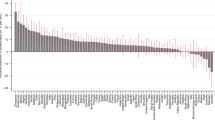Abstract
We join a growing body of literature suggesting that the languages people speak influence their decision-making. We tested whether dropping the first-person pronoun “I” affects pro-social behavior in a dictator game-like setting. To this end, we conducted an online randomized, incentivized experiment with a socially representative sample of 2000 Japanese respondents. We provide compelling causal evidence that pronoun dropping reduces pro-sociality. Given that our results provide little empirical support for previous research findings linking first-person pronoun use and lower pro-sociality, we prescribe caution in using languages as a proxy for culture in several cross-country empirical studies in economics.



Similar content being viewed by others
Notes
See Kay and Kempton (1984) for a survey of the literature.
Kashima and Kashima (1998) treated each country as a culture because the border of a country typically coincides with the boundary of a culture.
Kashima and Kashima (1998) focused on the linguistic rules across different cultures, while Utz (2004) examined the priming effect of the first-person pronoun at the individual level. These two lines of literature have a fundamental difference in methodology and thus we note that these two views do not contradict each other. In particular, Utz’s (2004) prediction is consistent with Kashima and Kashima’s (1998) if one’s central value is individualistic.
Please refer to the figure notes of Fig. 1 for the calculation of the SVO angle.
In our experiment, we controlled for reciprocity by excluding the possibility of being each other’s beneficiary.
We followed Murphy et al.’s (2011) SVO task and used the same phrasing as they did. The verb choice of “receive,” instead of other alternatives such as “give” (Yamamori et al. 2004), might have affected our findings. For example, if the subjects associated “receive” with a passive role (as opposed to associating “give” with an active role) in determining money allocation in a dictator game, they may have assumed lesser ownership over the endowment, leading to more pro-social choices. If this effect is enhanced by the use of “I,” then we would have observed a higher level of pro-sociality in the “with-I” condition.
The payment consisted of three components: (1) the reward from their own choices, (2) an allocation received from a randomly matched anonymous participant, and (3) a 50 JPY base participation amount. Our relatively small stakes might be a concern for some readers. However, Amir et al. (2012) validated experimental results with smaller stakes. The average earnings in our experiment were no smaller than those of a typical survey administered on an online platform, like Amazon Mechanical Turk.
The statistics are based on the Final Report of the 2010 Population Census, Japan. The number of subjects assigned to each of the 32 cells is reported in Table A.1 in Online Appendix II.
We also asked respondents to indicate their income level from a list of 11 categories, where category 1 denoted an annual household income of under 2 million JPY and category 11 corresponded to an annual income level of over 50 million JPY. We used the mid-point in each of the nine intermediate categories as the measure of pre-tax household income levels, except for the two extremes. Thus, respondents who reported categories 1, 2,…,11 as their income level were assigned annual household incomes of 1.5, 3,…,60 million JPY, respectively. Thus, the average pre-tax household income calculated was 5.84 million JPY.
We also checked whether the treatment effect was more pronounced in the first period and then decayed with repetitions and found that it did not. Instead, it persisted throughout the course of the experiment. The results are available upon requests.
We note that the passing rates of our participants in the comprehension test between “with-I” and “without-I” treatments were significantly different. Thus, one might argue that both groups differ in respects other than the language of manipulation. If there is any difference, perhaps it is in the cognitive burdens that two different manipulations of language cause. We relegate this investigation for future research.
Subjects received a fixed participation fee of 20 JPY in the follow-up survey.
In these two questions, subjects were asked to choose one of three options: (1) allocating more resources to the beneficiary in Version A (the “with-I” condition), (2) allocating more resources to the beneficiary in Version B (the “without-I” condition), and (3) indifferent among the two conditions.
References
Ackermann, K. A., & Murphy, R. O. (2012). Tutorial on how to evaluate the SVO slider measure’s secondary items. https://ryanomurphy.com/resources/SVO_second_item_tutorial.pdf.
Alesina, A., & Giuliano, P. (2015). Culture and institutions. Journal of Economic Literature, 53(4), 898–944.
Amir, O., Rand, D. G., & Gal, Y. K. (2012). Economic games on the Internet: The effect of $1 stakes. PLoS ONE, 7(2), e31461.
Breuer, W., Riesener, M., & Salzmann, A. J. (2014). Risk aversion vs. individualism: What drives risk taking in household finance? The European Journal of Finance, 20(5), 446–462.
Chen, M. K. (2013). The effect of language on economic behavior: Evidence from savings rates, health behaviors, and retirement assets. American Economic Review. https://doi.org/10.2139/ssrn.1914379.
Chen, J. I., He, T.-S., & Riyanto, Y. E. (2019). The effect of language on economic behavior: Examining the causal link between future tense and time preference in the lab. European Economic Review, 120, 103307.
Davis, L. S., & Abdurazokzoda, F. (2016). Language, culture and institutions: Evidence from a new linguistic dataset. Journal of Comparative Economics, 44, 541–561.
Falk, A., Becker, A., Dohmen, T., Enke, B., Huffman, D., & Sunde, U. (2018). Global evidence on economic preferences. Quarterly Journal of Economics, 133(4), 1645–1692.
Feldmann, H. (2019). Do linguistic structures affect human capital? The case of pronoun drop. Kyklos, 72, 29–54.
Gorodnichenko, Y., & Roland, G. (2011a). Individualism, innovation, and long-run growth. Proceedings of the National Academy of Sciences of the United States of America, 108, 21316–21319.
Gorodnichenko, Y., & Roland, G. (2011b). Which dimensions of culture matter for long-run growth? American Economic Review, 101, 492–498.
Gorodnichenko, Y., & Roland, G. (2017). Culture, institutions, and the wealth of nations. The Review of Economics and Statistics, 99(3), 402–416.
Hofstede, G. (2001). Culture’s consequences: Comparing values, behaviors, institutions and organizations across nations (2nd ed.). Thousand Oaks, CA: Sage.
Kammas, P., Kazakis, P., & Sarantides, V. (2017). The effect of culture on fiscal redistribution: Evidence based on genetic, epidemiological and linguistic data. Economics Letters, 160, 95–99.
Kashima, E. S., & Kashima, Y. (1998). Culture and language: The case of cultural dimensions and personal pronoun use. Journal of Cross-Cultural Psychology, 29(3), 461–486.
Kashima, Y., & Kashima, E. S. (2003). Individualism, GNP, climate, and pronoun drop. Journal of Cross-Cultural Psychology, 34(1), 125–134.
Kay, P., & Kempton, W. (1984). What is the Sapir-Whorf hypothesis? American Anthropologist, 86(1), 65–79.
Klasing, M. J. (2013). Cultural dimensions, collective values and their importance for institutions. Journal of Comparative Economics, 41(2), 447–467.
Licht, A. N., Goldschmidt, C., & Schwartz, S. H. (2007). Culture rules: The foundations of the rule of law and other norms of governance. Journal of Comparative Economics, 35(4), 659–688.
Murphy, R. O., Ackermann, K. A., & Handgraaf, M. J. J. (2011). Measuring social value orientation. Judgment and Decision Making, 6(8), 771–781.
Pérez, E. O., & Tavits, M. (2017). Language shapes people’s time perspective and support for future-oriented policies. American Journal of Political Science, 61(3), 715–727.
Roberts, S. G., Winters, J., & Chen, K. (2015). Future tense and economic decisions: Controlling for cultural evolution. PLoS ONE, 10(7), e0132145.
Sutter, M., Angerer, S., Glätzle-Rützler, D., & Lergetporer, P. (2018). Language group differences in time preferences: Evidence from primary school children in a bilingual city. European Economic Review, 106(July), 21–34.
Tabellini, G. (2010). Culture and institutions: Economic development in the regions of Europe. Journal of the European Economic Association, 8(4), 677–716.
Utz, S. (2004). Self-activation is a two-edged sword: The effects of I primes on cooperation. Journal of Experimental Social Psychology, 40(6), 769–776.
Acknowledgements
We thank the Handling Editor, two anonymous referees, Marie Claire Villeval, Ricardo Perez-Truglia, and seminar and conference participants at Kyoto University, Osaka University, University of Wisconsin-Madison, Waseda University, and the 2017 SABE Conference for helpful comments. He acknowledges financial support from Nanyang Technological University and the Ministry of Education of Singapore (HASS Start-Up Grant and MOE Academic Research Fund Tier 1 RG57/14). Tanaka acknowledges financial support from the Japan Society for the Promotion of Science (JSPS) (Grant No. 16703285). Yamada acknowledges financial support from the JSPS (Grant No. 16H05951).
Author information
Authors and Affiliations
Corresponding author
Additional information
Publisher's Note
Springer Nature remains neutral with regard to jurisdictional claims in published maps and institutional affiliations.
Electronic supplementary material
Below is the link to the electronic supplementary material.
Rights and permissions
About this article
Cite this article
He, TS., Riyanto, Y.E., Tanaka, S.C. et al. Pronoun drop and prosocial behavior: experimental evidence from Japan. J Econ Sci Assoc 6, 13–25 (2020). https://doi.org/10.1007/s40881-020-00083-4
Received:
Revised:
Accepted:
Published:
Issue Date:
DOI: https://doi.org/10.1007/s40881-020-00083-4




